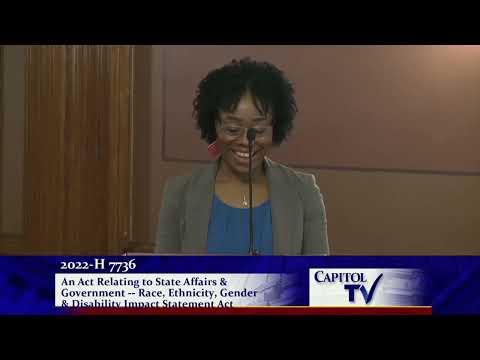Race, ethnicity, gender and disability impact statements could change the conversation at the General Assembly
“Assessments, such as fiscal notes and environmental impact reports, are already tools for predicting the impacts of legislation,” said Representative Liana Cassar. “H7736 adds a race, ethnicity, gender, and disability impact statement to those resources that we already depend upon.”
April 11, 2022, 12:41 pm
By Steve Ahlquist
Last Wednesday Representative Liana Cassar (Democrat, District 66, Barrington, East Providence) introduced an important piece of legislation that could have a positive effect on crafting equitable legislation going forward.
H7736 would “require the general assembly to include combined race, ethnicity, gender and disability impact statements to any legislation that pertains to human services, medical, dental or behavioral health care, disability services, housing or housing assistance; legislation regarding education; legislation regarding employment and labor; legislation regarding land use and transportation; legislation that will have economic or environmental impacts on communities; and legislation that pertains to the criminal justice system.“
Let me explain.
Under the current system, Rhode Island’s legislature routinely relies on tools such as fiscal notes and environmental impact reports when weighing possible legislation. Consider, for instance, bill S0908, to make RIPTA buses free for all riders. When that bill comes up for consideration, it comes with a fiscal note attached, one that points out that such a program would cost the state $25 million annually.
On the other side, there may be a positive environmental impact when more people take the free and convenient bus and stop using their cars. Were this information to be studied and assessed, it would be included with the bill as an environmental impact statement.
Representative Cassar’s bill would require similar impact statements that take into account a bill’s possible racial, ethnic, gender and disability impacts, for all future legislation.
“The aim of bill H7736 is to add a tool to our legislative toolbox so that wherever we can, we assess the anticipated impacts of our legislation on communities that have traditionally been disadvantaged due to the unintended consequences of policies,” said Representative Cassar, presenting her bill for the first time before the House Committee on State Government and Elections. “Assessments, such as fiscal notes and environmental impact reports, are already tools for predicting the impacts of legislation. H7736 adds a race, ethnicity, gender, and disability impact statement to those resources that we already depend upon.“
Here’s the full video, including testimony in support of the bill from the Economic Progress Institute and Rhode Island Kids Count.
“We’re all aware that policies often have unintended consequences that would be best addressed and considered prior to passage and adoption,” continued Representative Cassar. “Every legislative body in the country, on occasion, has passed legislation that has resulted in unintended negative consequences for women, black, Latino, and indigenous communities, as well as individuals with disabilities. Policy driven disproportionate impacts have led to poor health outcomes, low educational attainment, and low socioeconomic levels.
“In turn they’ve exacerbated increased rates of chronic health issues, justice system involvement, incarceration,. increased public health risk, and east involvement with state agencies and monitoring resulting in disenfranchisement and distrust of systems and government. Starting in 2007 and 2008, a handful of states, including Connecticut and Massachusetts, began discussing and piloting the, the use of racial impact statements to address disparities in their criminal justice systems. Along with the groundbreaking assistance of The Sentencing Project whose work on impact statements has focused mainly on their use in criminal justice. Other states across the country have proposed and implemented impact statements as part of sector and statewide efforts to address disparities over the past 15 years.
“In 2019, Maine took a different approach and established the Permanent Commission on the Status of Racial, Indigenous, and Tribal Populations to examine systemic racial disparities and advise all three branches of government on public policy changes that would make racial equity a central consideration in their states’ law making.
“The legislation before you today aims to build on that foundation with a different but simpler approach, proposing the establishment of the combined race, ethnicity, gender, and disability impact statement to inform our policy debate and to improve the legislature’s ability to avoid perpetuating disparities and to increase equity through better informed policy. This statement will be an impartial, simple and understandable statement included as a section of the bill language, demonstrating that the bill sponsor has taken into account the impact, positive or negative, that legislation will have on historically disadvantaged communities.
“Bill sponsors may work in conjunction with state agencies to obtain any necessary demographic data to inform the content of the statement, which will include a description of how the legislation will or will not provide corrective actions for policies that have previously resulted in disparities by race, ethnicity, gender, and disability. It will include a reference to historic disparities and a reference to any existing efforts to address those disparities. The impact statements will be required when proposed legislation pertains to expenditures or policy regarding human services, medical, dental, or behavioral healthcare; disability services, housing, or housing assistance; education, employment, and labor; land use, and transportation; economic and environmental policy, and policies pertaining to criminal justice.
“The impact statement requirement may be waived if there’s no discernible impact based on race, ethnicity, gender, or disability.
“As we pursue equity in our systems and in our state, understanding that inequality has resulted in human and economic suffering, the impact statement is a step that we, as legislators, can take to assure that we are not perpetuating harmful disparities in our systems and policies.“
The legislation is also supported by the Latino Policy Institute, the Rhode Island ACLU, the Rhode Island Working Families Party, and the Women’s Fund of Rhode Island. The new director of the Economic Progress Institute, Weayonnoh Nelson-Davies, J.D., chose this bill for her first in-person testimony before the General Assembly.







